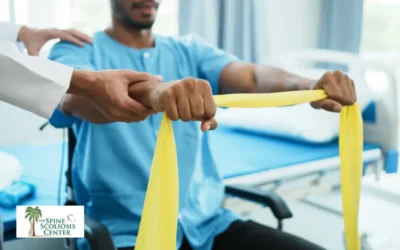Back pain is extremely common, and for the majority of people who experience back pain is only a benign annoyance that can be corrected with holistic methods and lifestyle changes. But how can you tell when back pain is symptomatic of a more severe condition? When does common aches and pains turn into something you should goto the doctor for? There are several red flags to watch out for when it comes to back pain, and if your back pain is occurring in conjunction with any of the symptoms we describe below, you should book a doctor’s appointment. Read on to learn more about when back pain is symptomatic of something serious and you should consult with your doctor.
When You Should Go To The Doctor For Back Pain
If you experience the following symptoms and conditions along with persistent back pain, you should speak to your doctor.
- Fever: While the flu can cause you to feel achy, an unresponsive fever paired with back pain may indicate a serious infection. Your primary care doctor can rule this out, and if it is an infection, you may need antibiotics. Back pain may be a secondary consequence of an infection that is causing the fever. Once you begin to feel better, you should start resuming your daily activities, as prolonged bed rest can weaken your muscles and make your back pain worse.
- Tingling or numbness: Numbness or prickly tingling can be more than just your feet falling asleep. When paired with back pain, it is typically indicative of nerve irritation or damage, and is much more clinically significant than your typical pain. If the pins-and-needles sensation persists, you may have one of several underlying conditions like spinal stenosis or a herniated disc, which can cause nerve pressure. Prolonged nerve irritation and damage left untreated can result in permanent disabilities.
- Trauma: If you’ve experienced a serious trauma, such as a car accident or a significant slip-and-fall, or are over 50 and experienced minor trauma, your doctor will want to take a deeper look at your back pain. After a certain age, even falling down a few steps can result in a fracture. Your doctor will determine if there is a fracture through X-rays.
- Sudden loss of bladder or bowel function: Back pain combined with a loss of bowel or bladder control signals an extremely serious and rare condition known as cauda equina syndrome, where the nerve roots in the lower end of the spinal cord experience compression and get paralyzed. Cauda equina syndrome is a medical emergency requiring immediate attention.
- Foot drop: If your toes drag along the ground when walking to the point where you need to consciously lift your foot higher to compensate for the dragging, you may have foot drop. Foot drop may be symptomatic of a larger nerve, muscle, or brain problem.
- Medical history of chronic illnesses such as cancer, suppressed immune system, etc.: If you have a history of cancer or immune suppression, your doctor will want to rule those out as underlying causes of your back pain.
Contact Us Today
If you have any of these conditions along with lingering back pain, you should consult with your physician. Call The Spine and Scoliosis Center to schedule an appointment at one of our Florida clinics today.




0 Comments